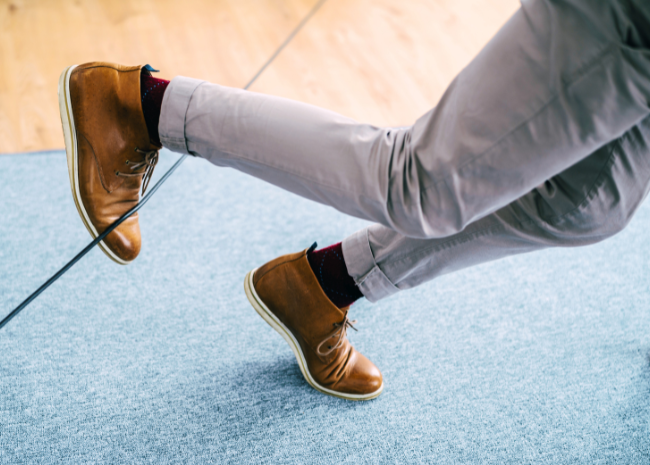
The Jackson Clinics is dedicated to ensuring the safety and well-being of our patients, especially seniors. Falls are a significant health concern, particularly for the elderly, and can lead to serious complications. In this article, we’ll explore 5 fall prevention tips to keep you steady on your feet and living life to the fullest.
Understanding the risks for falls is the first step in preventing them.
Risk factors for falls can differ among individuals, but common ones include:
- Age: The risk of falling increases with age
- Previous falls: A history of falls increases the likelihood of future falls
- Chronic health conditions: Conditions like arthritis, Parkinson’s disease, or stroke can affect balance and increase fall risk
- Poor vision: Vision problems or inappropriate eyewear can contribute to falls
Now, let’s dive into the top 5 fall prevention tips to help you stay safe and steady.
5 Fall Prevention Tips
Tip #1: Keep Your Home Safe
Recognizing fall hazards at home is vital in preventing falls in the elderly. Many falls occur at home due to easily preventable hazards.
Here are a few ways you can prevent falls at home:
- Remove Clutter: Keep floors clear of items like shoes, books, and cords.
- Secure Rugs: Use non-slip mats or tape to hold down rugs and carpets.
- Install Grab Bars and Handrails: Place them in the bathroom and along staircases.
- Improve Lighting: Ensure all areas, especially stairs and hallways, are well-lit.
- Fix Uneven Floors: Repair loose or uneven flooring to prevent tripping. Clear walkways, secure loose rugs, use grab bars in the bathroom, and ensure good lighting.
Here is a list of risks to consider when fall-proofing your home, compiled by our physical therapists.
TIP #2: Strength & Balance Training
Regular physical activity not only enhances muscle strength, flexibility, and coordination, but also promotes bone health, reduces chronic condition risks, and boosts overall well-being.
- Exercise Regularly: Engage in activities like walking, Tai Chi, or yoga.
- Strength Training: Use light weights or resistance bands to build muscle strength.
- Balance Exercises: Practice standing on one foot or walking heel-to-toe.
- Join a Class: Consider group fitness classes designed for balance and stability.
- Stay Consistent: Aim for at least 30 minutes of physical activity most days of the week.
One of the best ways to prevent falls is retraining your ability to safely get down to the floor. Here are videos of four different techniques you can try today!
TIP #3: Check Your Medications
To prevent falls, it’s important to review your medications regularly.
- Consult Your Doctor: Talk to your healthcare provider about the side effects of your medications, especially those that can cause dizziness or drowsiness.
- Update Your Medication List: Keep an updated list of all the medications you take, including over-the-counter and supplements, and share it with your healthcare team.
- Ask About Alternatives: Inquire about alternative medications with fewer side effects that could reduce your risk of falling.
- Follow Dosage Instructions: Take medications as prescribed and avoid skipping doses or changing your dosage without consulting your doctor first.
TIP #4: Regular Health Assessments
Regular health check-ups are a must in fall prevention interventions. They help you stay alert, aware, and up-to-date on any health concerns that could put you at risk for fall-related injuries.
- Vision and Hearing Tests: Get your vision and hearing checked annually to maintain awareness of your surroundings
- Physical Examinations: Regular physical exams help identify any underlying health issues that may affect balance or mobility.
- Monitor Chronic Conditions: Identify and manage conditions (e.g., diabetes, arthritis) that can affect balance, strength, and coordination.
- Manage eating & drinking patterns: Proper nutrition and hydration support overall strength, balance, and cognitive function, reducing the risk of dizziness and instability.
- Foot Health: Regularly check your feet for any issues like pain, numbness, or sores, and seek medical attention promptly if needed to prevent falls related to foot problems.
Check out our adapted Tinetti Balance Assessment Tool to help you assess the likelihood of a fall.
TIP #5: Footwear and Assistive Devices
Educate yourself on safety tips, wear properly fitting shoes, and consider using assistive devices (e.g., canes, walkers) if needed to stay safe.
- Choose Appropriate Footwear: Opt for shoes with non-slip soles and good support to maintain stability.
- Check Fit Regularly: Make sure your shoes fit well and replace them if they become worn out or loose.
- Use Assistive Devices: If needed, utilize canes, walkers, or mobility aids to improve balance and prevent falls.
- Keep Devices Handy: Always have your assistive devices within reach to use when navigating tricky or unfamiliar terrain.
Expert physical therapists can provide personalized exercise programs to meet your unique needs.
At The Jackson Clinics, we offer a range of services focused on fall prevention interventions to help you take a step towards safety and a healthier future.
Did you know you have Direct Access* to Physical Therapy? No referral, no problem!


















